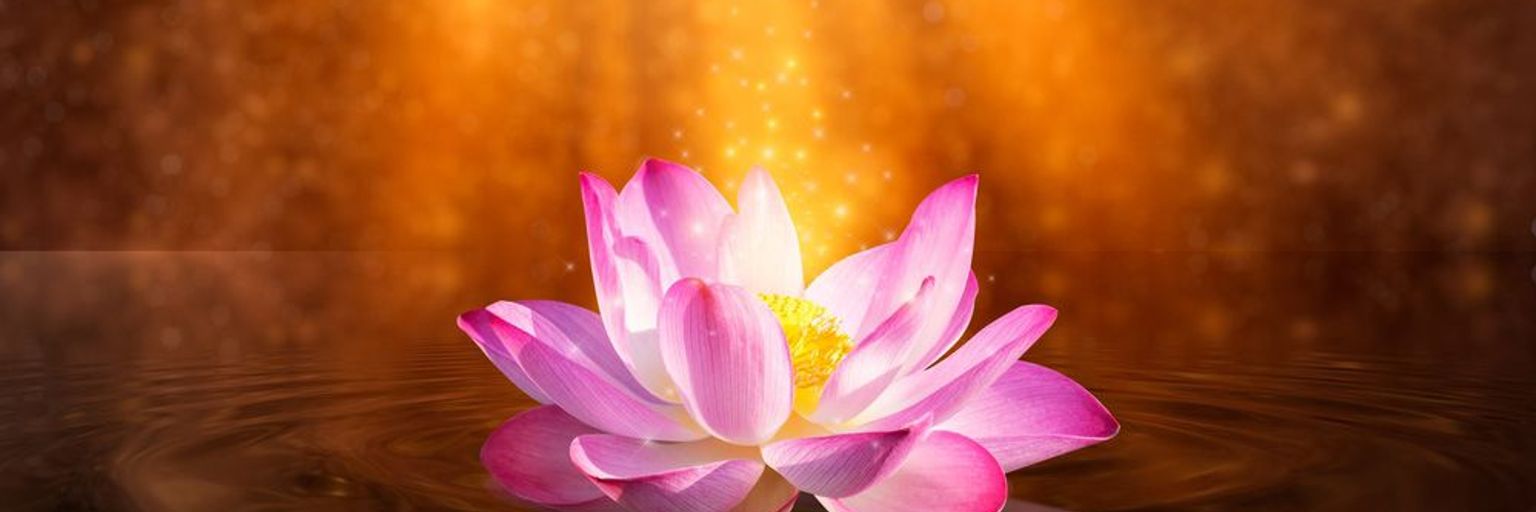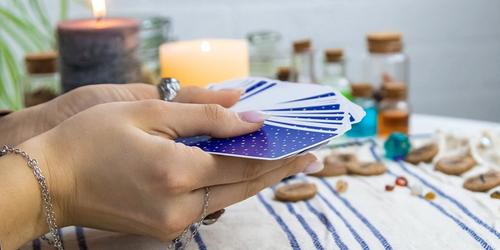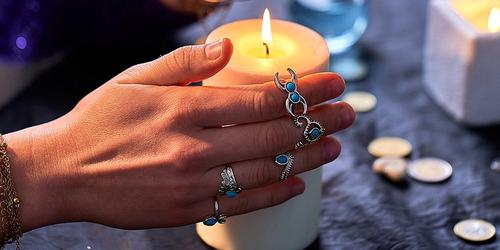
To pay for your reading on your telephone bill, simply call
Instantly message our featured psychics online via psychic messenger.
Click to start
Register now to start your reading online. PSYCHIC MESSENGER- Cheapest psychic service in the UK
- Our readers are available 24/7
- 100% confidential service
- In-depth, concise, personal readings
- Thousands of 5* reviews
Published 16/04/2023 • Updated 11/12/2023 by Joanne Jones
Spiritual Flowers
Spiritual flowers symbolise the divine essence, an essential element in many religious and spiritual practices. These flowers are a powerful tool for connecting with the spiritual realm and communicating with the divine.
In different traditions, the spiritual meaning of flowers can vary as specific flowers represent certain spiritual attributes. In Hinduism, the lotus flower's spiritual meaning is to symbolise pure and divine creation, while in Buddhism, the chrysanthemum represents awakening and enlightenment.
Spiritual flowers are vital to unlocking one's spiritual potential and offer a path to connect with the divine. Spiritual practitioners eagerly seek these flowers for their healing and transformative qualities.
The Spiritual Meanings of Different Flowers
Flowers have fascinated human societies for centuries due to their beauty and natural scents.
They are not merely beautiful objects to decorate homes and gardens but hold many spiritual meanings in different cultures worldwide. Flowers have been used in rituals and religious ceremonies to represent other emotions, virtues, and symbols.
Flowers' spiritual meanings vary across different cultures and societies, and understanding these meanings adds depth and richness to the human experience.
Whether it is the rose, the lotus, the daisy, or the cherry blossom, each flower represents unique virtues, emotions, and symbols that hold value in our lives. Here we are going to go through a range of popular spiritual flowers.
Lotus Flowers
The spiritual significance of flowers has been valued among different cultures throughout history. Each flower is believed to hold a unique energy and message based on its colour, scent, and shape.
The lotus flower has been widely regarded as among the most sacred flowers across various religions, including Hinduism, Buddhism, and Egyptian mythology.
In Hinduism, the lotus flower symbolises purity and enlightenment, often depicted as growing from the murky waters of a pond or lake. The flower represents the unfolding of the spiritual awakening and breaking free from the material world.
According to Hindu mythology, goddess Lakshmi, the goddess of prosperity and wealth, is often seen sitting on a lotus flower, signifying her purity and divine nature.
Similarly, in Buddhism, the lotus flower represents the journey towards enlightenment, as Buddha is often depicted meditating on a lotus flower.
Interestingly, the lotus flower holds spiritual significance for the ancient Egyptians, who believed it symbolised the sun and creation. The flower was often used in temple carvings and drawings, depicting the sun-god Ra holding a lotus flower.
The Egyptians believed that the lotus flower would open in daylight and close at night, representing the regeneration of the sun.
In addition to its spiritual symbolism, the lotus flower holds medicinal properties. The flower boasts anti-inflammatory and anti-microbial properties, which have been used in traditional medicine for centuries.
Specifically, the root of the lotus flower has been used to overcome a range of ailments, such as diarrhoea, fever, and inflammation.
The lotus flower is an exquisite, multi-layered flower that holds immense spiritual and cultural significance even today.
Roses
Flowers have been revered for their natural beauty and have played a significant role in various cultures for centuries.
Beyond their physical appearance, flowers hold symbolic meaning, and the energy of flowers has intrigued humans for generations. One of the most popular flowers with significant spiritual meanings is the rose.
Roses have been treasured for their beauty and fragrance since ancient times. Due to their captivating beauty, roses are often associated with love, romance, and passion. However, other spiritual meanings associated with roses go beyond their physical beauty.
The rose has long been a symbol of the divine feminine. Roses are associated with Goddesses and are revered for their feminine energy. The rose is also considered a symbol of Venus, the goddess of love and fertility, owing to the rose's connection to the heart chakra.
Additionally, roses are also given spiritual significance in Christian traditions. It is said that the rose symbolises the Virgin Mary and her purity. The five petals of a rose represent the five wounds of Christ, while the colour red represents his blood.
Beyond their spiritual significance, different coloured roses also hold different meanings. Red roses are often associated with deep affection and love, while white roses represent purity and innocence.
Pink roses symbolise grace and gratitude, and yellow roses are often associated with friendship, peace, and joy. Pink roses, meanwhile, are often linked to gratitude and appreciation, with light shades representing friendship and darker shades symbolising grace and admiration.
White roses are linked to purity, innocence, and spiritual enlightenment, making them popular for weddings and religious ceremonies. They can also represent new beginnings, making them a fitting gift for someone starting a new chapter in their life.
Yellow roses, on the other hand, are often seen as a symbol of friendship and joy. They can represent warmth, happiness, and positive energy, making them a fantastic choice for celebrating a company or brightening someone's day.
Sunflowers
Sunflowers are known for their radiant yellow petals that resemble the sun. What do yellow flowers mean spiritually?
They hold deep spiritual secrets beyond their physical appearance. In many cultures, sunflowers represent happiness, good fortune, and positivity. The Aztecs worshipped sunflowers as a symbol of their sun god, and as a result, the plant was often used in religious ceremonies.
Sunflowers are strongly associated with the solar plexus chakra, located in the abdominal area and responsible for personal power, confidence, and self-esteem. In aromatherapy, the essential oil extracted from sunflowers balances and energises this chakra.
Sunflowers are also believed to have a cleansing effect on the aura, removing negative energy and promoting positive vibes.
In the language of flowers, sunflowers symbolise adoration, loyalty, and longevity. They are used in divination practices to provide guidance and insight into life's journey.
Daisies
Daisies are a well-known spiritual meaning flower across various cultures. This flower is unique in its simplicity yet evokes a sense of joy and innocence. The special meanings of daisies are varied and depend on the cultural context.
In ancient Roman and Greek cultures, daisies were heavily associated with the goddess of love, Aphrodite.
Mythology depicts daisies growing from the goddess's tears as she mourned her lover's death. This association with love and romance has carried through to modern times, where daisies are often used in wedding bouquets and as a symbol of purity and innocence.
Daisies are timeless flowers that carry deep spiritual meanings across various cultures. From love and fertility to purity and innocence, the daisy's significance has evolved but remains a symbol of hope, joy, and new beginnings.
Orchids
Orchids are prestigious flowers that hold significant meanings. These perennials are members of the largest family of flowering plants and come in various colours and shapes, making them stand out in gardens and floral arrangements.
Ancient Greece's orchids were associated with virility and fertility, and their roots were believed to be an aphrodisiac. As such, these flowers were given to newlyweds on their wedding nights to promote intimacy and conception.
In spirituality, the meanings of orchids vary across cultures, but they all agree that these flowers hold significant value and symbolism. From strength and bravery to luxury, orchids are one of nature's wonders.
Other Flowers
Spiritual flowers have held a special place in different cultures and societies throughout history. They are often valued for their aesthetic beauty and fragrant scents, but they also hold spiritual significance.
Flowers have been linked with meanings and symbolism in various cultures, religions, and traditions, such as the African Violet, Indian Jasmine, Bush Violet, Blue Orchid, and African Marigold.
Purple flowers have been highly regarded for their spiritual significance throughout human history.
The Iris has been associated with divine wisdom, courage, and spiritual faith. This flower was highly prized in ancient Greece and Rome, where it was believed to be a messenger of the gods. Its striking blue or purple petals were thought to represent the heavens.
Similarly, the lily has long been regarded as a symbol of purity, innocence, and the promise of eternal life. It has been used in religious ceremonies, including weddings and funerals, for centuries and is still highly valued today. The white lily is considered a holy flower in many traditions and is often associated with the Virgin Mary.
Meanwhile, the chrysanthemum is a common flower in Asian cultures, particularly Japan. It has been used for spiritual and ceremonial purposes for centuries and is highly regarded for its beauty and symbolism.
In Japanese culture, the chrysanthemum represents the Emperor and the Imperial family and is often used as a symbol of the Japanese people. It is also believed to have healing properties and is often used in traditional medicine.
Overall, these flowers represent some of humanity's deepest spiritual and cultural values. They are symbols of hope, faith, and the promise of eternal life, and their beauty and significance continue to inspire and uplift people worldwide.
The Spiritual Meanings of Flower Colours
The Spiritual meaning of flower colours has always created much interest. The interpretation of flower colours has varied by culture and religion.
The flower colours may also have some scientific basis. Studies have shown that looking at specific colours can elicit certain emotional responses, impacting our mood and well-being. It is believed that shades of green can reduce anxiety and promote calm and relaxation.
The interpretation of flower colours can vary by culture, personal experiences, and individual beliefs.
What may hold spiritual significance for one person may hold a different meaning for another. Despite this, the deep-rooted symbolism and interpretations of flower colours are a reminder of the powerful connection between nature, spirituality, and human emotion.
Using Flowers in Spiritual Practices
Spiritual flowers have been used as an integral part of spiritual practices in different cultures for centuries.
Blooms hold a significant place in spiritual rituals, from offering flowers to deities to using flower essences for healing.
The symbolic significance of flowers varies across different spiritual and religious practices. In Hinduism, flowers such as lotus, marigold, and jasmine are considered sacred and used for deities' puja (worship). In Buddhism, spiritual flowers symbolise the impermanence of life, and flowers are offered to Buddha to pay homage and gain merit.
In Christianity, white lilies symbolise resurrection and purity and are often used in Easter celebrations.
Flower essence therapy is another way a wide range of flowers can be used for spiritual practices. This alternative medicine form uses flowers' energy and essence to heal emotional and mental imbalances.
The healing properties of different flowers are believed to resonate with and affect specific emotional states.
The practice of placing flowers on graves or creating flower mandalas is another way in which flowers are used in spiritual practices. These practices are often done to honour the dead or to create a sense of peace and tranquillity.
Incorporating Flowers in Meditation and Yoga
Spiritual flowers are a significant part of meditation and yoga practices thanks to their innate ability to calm and soothe the senses. Incorporating flowers in meditation and yoga can elevate the experience and deepen the impact of these practices.
Flowers' beauty and fragrance can profoundly impact the nervous system, helping to reduce stress and anxiety while creating a peaceful and serene atmosphere.
The use of flowers in meditation and yoga can enhance focus, improve introspection, and allow the mind to enter deep relaxation and mental clarity. Floral scents are the most popular way to incorporate flowers in meditation and yoga.
Using Flower Essences for Spiritual Healing
Flower essences are natural remedies that capture the energy of flowers to stabilise and restore emotional and spiritual balance.
Flower essences can be particularly effective in addressing anxiety, depression, and stress and promoting feelings of positivity, inner harmony, and inner peace.
The healing energy of flower essences is based on the principle that every living creature, including plants, has an energetic field or vibrational pattern.
The vibration of a particular plant can be utilised to stimulate healing and restore balance in the human body. This holistic approach recognises the connection between human beings' physical, emotional, mental, and spiritual aspects.
Spiritual Readings
Trusted Psychics is a highly reputed platform where you can find expert psychics who offer a range of spiritual readings to provide clarity and guidance on all aspects of life.
With a team of skilled and reliable psychics, Trusted Psychics is committed to promoting spiritual well-being and supporting individuals in achieving their goals.
Our live psychic readers and Live Messenger psychics deeply understand spirituality and the interconnectedness of all things. They provide advice on relationships, career, or personal development.
The expert psychics at Trusted Psychics can use their psychic abilities to provide valuable insights and perspectives on the issues that matter most.
People seek spiritual readings for various reasons, including gaining insight into their personal and professional lives, seeking guidance on important decisions, finding peace and inner clarity, and connecting with loved ones who have passed on.
Spiritual readings are believed to offer an avenue for gaining knowledge beyond what is perceivable by the five senses, tapping into a realm of greater consciousness.
One of the primary reasons people turn to spiritual readings is to gain a deeper understanding of themselves and their life journeys. This is often facilitated through practices such as tarot card readings, astrology charts, and psychometry, where the psychic uses objects and images to gain insights into the individual's life.
The information gained in spiritual readings helps people tap into their intuition and inner wisdom, make more informed choices, and establish a deeper connection with themselves and their surroundings.
Another reason people seek spiritual readings is to connect with loved ones who have passed on. Mediums specialising in communicating with the dead can offer comfort and solace to those in grief and deliver messages from beyond the grave. Spiritual readings can also serve as a form of catharsis, helping individuals to work through unresolved emotions and find closure in their relationships.
FAQs
What Do Flowers Mean Spiritually?
Flowers have held significant meanings in various cultures and traditions for centuries.
Using flowers' energy in spiritual practices can be traced back to ancient civilisations, Greek mythology, Romans, and Egyptian times.
What do flowers mean spiritually? Spiritually, the energy of flowers is often associated with emotions, symbolism, and meanings that reflect human experiences. Spiritual flowers are believed to possess healing properties and positive energy that can aid in spiritual and emotional healing.
Spiritual flowers hold great spiritual significance and are used for various purposes, such as ceremonies, rituals, and healing practices. The spiritual meaning of flowers reflects the deep connections between human emotions, the natural world and spiritual energy.
What Do Pink Flowers Mean Spiritually?
What do pink flowers mean spiritually? Pink flowers are often associated with love, compassion, and kindness.
Spiritually, pink, beautiful flowers represent unconditional love and harmony, making them popular for ceremonies and rituals. Pink flowers, such as roses or lotuses, are often used in meditation practices to promote inner peace and balance.
Pale pink roses' symbolic meaning represents gentleness and joy, while darker shades of pink can represent gratitude and admiration.
Pink flowers can also express femininity, spiritual beauty, and grace. The spiritual energy of pink is said to promote positive energy and emotional balance and alleviate stress and anxiety.
What Do Purple Flowers Mean Spiritually?
Purple flowers are widely known for their spiritual significance, representing elegance, dignity, and royalty.
In several cultures, purple flowers are believed to symbolise protective energy, calmness, and peace. Spiritual healers and alternative medicine practitioners consider the purple flower's energy vital in stimulating mental clarity, inducing calm and tranquillity, and encouraging spiritual growth.
In some religions, purple flowers hold spiritual significance. For instance, in Christianity, purple flowers symbolise the resurrection and mercy of Christ.
In the Jewish faith, purple flowers signify divine intervention, as they believe that it was through a purple flower that God healed a wounded soldier named Serach. In Hinduism, purple flowers symbolise the third eye of Lord Shiva, representing spiritual awakening, wisdom, and illumination.
Aside from their spiritual significance, purple flowers offer several health benefits. The colour purple is often associated with pain relief, and it is believed that purple flowers can help alleviate migraine headaches, reduce inflammation, and promote restful sleep.
Furthermore, purple flowers contain properties that help lower blood pressure levels, strengthen the immune system, and combat respiratory issues.
Throughout history, the language of flowers has been used to convey various emotions and sentiments. Purple and blue flowers signify a powerful spiritual message through delicacy and charm.
The purple colour symbolises sadness but also royalty and penance.
What Do Yellow Flowers Mean Spiritually?
Yellow flowers are often associated with spiritual meanings such as love, friendship, and joy. In ancient times, yellow was associated with the sun and was considered a symbol of life, energy, and vitality.
In the spiritual context, yellow flowers are believed to represent new beginnings and can be used as a symbol of hope and optimism.
Additionally, in aromatherapy, yellow flowers have energising properties that can help reduce feelings of anxiety and depression. The scent of yellow flowers such as chamomile, sunflowers, and daisies can stimulate the senses and help promote well-being and happiness.
In many cultures, yellow flowers are often given as a gift to express friendship and affection. The vibrancy of the colour yellow is believed to represent radiance and enthusiasm for life, making it an ideal gift for those who radiate positivity and enthusiasm.
What Does a Lotus Flower Mean Spiritually?
The lotus flower's spiritual meaning symbolises purity, enlightenment, and transcendence.
The white flower represents the soul's journey from darkness and ignorance to spiritual enlightenment and the realisation of spiritual awakening.
The lotus flower also represents the ability to rise above challenging circumstances and emerge untouched and unblemished, much like the flower itself that blooms in muddy and stagnant waters.
How to Contact a Trusted Psychic
Phone a live Psychic 24 hours a day View all our live phone psychic and tarot readers online.
Message a live Psychic 24 hours a day: View all our live messenger psychic and tarot readers online.
Text a live Psychic 24 hours a day: View all our live text psychic and tarot readers online.
How To Contact A Trusted Psychic
Phone a live Psychic 24 hours a day
View all our live phone psychic and tarot readers online.
View All Live readersMessage a live Psychic 24 hours a day:
View all our live messenger psychic and tarot readers online.
launch messengerRecent Articles From the Trusted Psychics Blog

Pink Aura Meaning Video
In this video, we'll explore the traits & strengths of those with pink auras. People with pink auras are often natural healers, empaths, and creative souls.

Green Aura Meaning Video
Explore all about green aura meanings in this Trusted Psychics video. Let's explore the fascinating world of auras & uncover the secrets of your energy field.

How to Prepare for a Spiritual Reading
Discover how to prepare for a spiritual reading with our comprehensive guide. Learn mental, emotional, and spiritual tips for a transformative experience.

How Does a Spiritual Reading Work?
Discover how a spiritual reading works, from connections and tools to choosing the right reader. Learn about the process, benefits, and what to expect.

Types of Spiritual Readings
Explore different types of spiritual readings, including psychic, mediumship, and tarot. Learn how each works and which might be right for you.

Spiritual Places to Visit in the UK
Explore enchanting places to visit in the UK. From ancient stone circles to serene abbeys and mystical landscapes, discover spiritual places across the UK.

